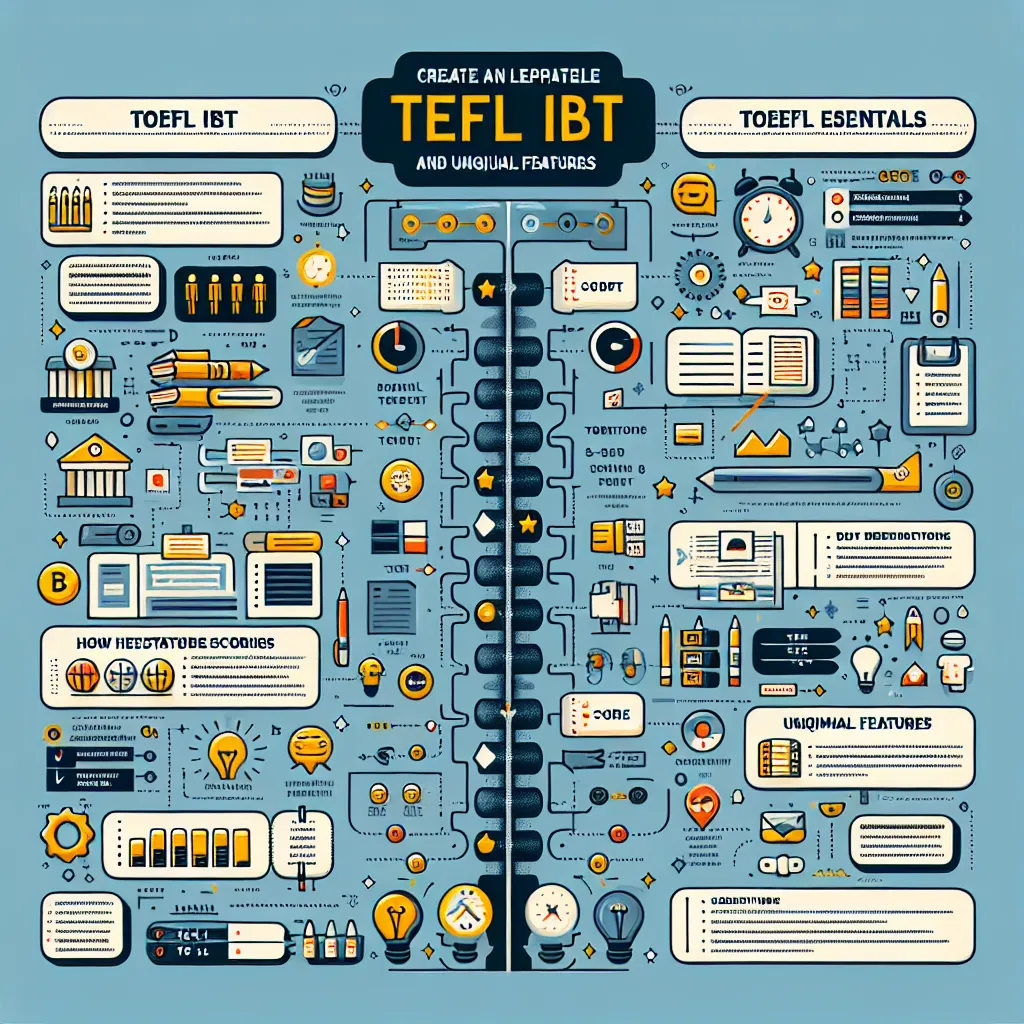Are you planning to take the TOEFL exam but feeling confused about which version to choose? You’re not alone. Many test-takers find themselves wondering about the differences between TOEFL iBT and TOEFL Essentials. In this comprehensive guide, we’ll break down the key distinctions between these two formats, helping you make an informed decision for your English proficiency test.
Understanding TOEFL iBT and TOEFL Essentials
Before we dive into the differences, let’s briefly introduce both test formats:
TOEFL iBT (Internet-Based Test)
TOEFL iBT is the more traditional and widely recognized version of the TOEFL exam. It’s been around for many years and is accepted by most institutions worldwide.
TOEFL Essentials
TOEFL Essentials is a newer test format introduced by ETS (Educational Testing Service) in 2021. It’s designed to be a more accessible and affordable option while still maintaining high standards of English proficiency assessment.
 TOEFL iBT vs TOEFL Essentials Comparison
TOEFL iBT vs TOEFL Essentials Comparison
Key Differences Between TOEFL iBT and TOEFL Essentials
Let’s explore the main differences between these two TOEFL formats:
1. Test Duration and Structure
TOEFL iBT:
- Total duration: About 3 hours
- Four sections: Reading, Listening, Speaking, and Writing
- Each section is given equal weight in scoring
TOEFL Essentials:
- Total duration: 1.5 hours
- Four sections: Reading, Listening, Speaking, and Writing
- Adaptive test design, adjusting difficulty based on performance
2. Test Delivery and Accessibility
TOEFL iBT:
- Primarily taken at test centers
- Home Edition available for remote testing
TOEFL Essentials:
- Designed primarily for at-home testing
- Requires a computer with a camera and stable internet connection
3. Scoring System
TOEFL iBT:
- Score range: 0-120 (0-30 for each section)
- Scores valid for 2 years
TOEFL Essentials:
- Score range: 1-12 (reported in 0.5-point increments)
- Scores valid for 2 years
4. Content and Question Types
TOEFL iBT:
- Academic-focused content
- Longer reading passages and listening lectures
- Integrated tasks that combine multiple skills
TOEFL Essentials:
- Mix of academic and general English content
- Shorter, more varied tasks
- Includes personal questions to assess communication skills
5. Speaking Section
TOEFL iBT:
- 4 speaking tasks
- Responses are 45-60 seconds long
TOEFL Essentials:
- 5 speaking tasks
- Shorter response times (15-30 seconds)
6. Writing Section
TOEFL iBT:
- 2 writing tasks (Integrated and Independent)
- 50 minutes total
TOEFL Essentials:
- 2 writing tasks (1 email task, 1 extended response)
- 25 minutes total
Which Test Should You Choose?
Deciding between TOEFL iBT and TOEFL Essentials depends on several factors:
-
Institutional Requirements: Check which test is accepted by your target institutions. TOEFL iBT is more widely recognized, but TOEFL Essentials is gaining acceptance.
-
Test Format Preference: If you prefer longer, more in-depth tasks, TOEFL iBT might be better. For shorter, varied tasks, consider TOEFL Essentials.
-
Time Constraints: TOEFL Essentials is shorter, which might be preferable if you have limited study time.
-
Test Environment: If you’re comfortable testing at home, TOEFL Essentials offers more flexibility. For a traditional test center experience, TOEFL iBT might be your choice.
-
Budget: TOEFL Essentials is generally more affordable than TOEFL iBT.
Preparing for Your Chosen TOEFL Test
Regardless of which test you choose, proper preparation is key to success. Here are some tips:
-
Familiarize yourself with the test format: Use official ETS materials to understand the structure and question types.
-
Practice regularly: Focus on all four language skills – reading, listening, speaking, and writing.
-
Take practice tests: Simulate test conditions to build stamina and time management skills.
-
Improve your general English: Both tests assess overall English proficiency, so work on expanding your vocabulary and grammar knowledge.
-
Use official prep resources: ETS offers preparation materials for both TOEFL iBT and TOEFL Essentials.
Conclusion
Both TOEFL iBT and TOEFL Essentials are reputable English proficiency tests, each with its own strengths. TOEFL iBT offers a more traditional, academically focused assessment, while TOEFL Essentials provides a shorter, more varied test experience. Consider your personal preferences, institutional requirements, and preparation time when making your choice. Whichever test you select, dedicated preparation and practice will be crucial to achieving your desired score.
Remember, the goal of both tests is to assess your English language skills accurately. Focus on improving your overall English proficiency, and you’ll be well-prepared for success in either format. Good luck with your TOEFL preparation!




